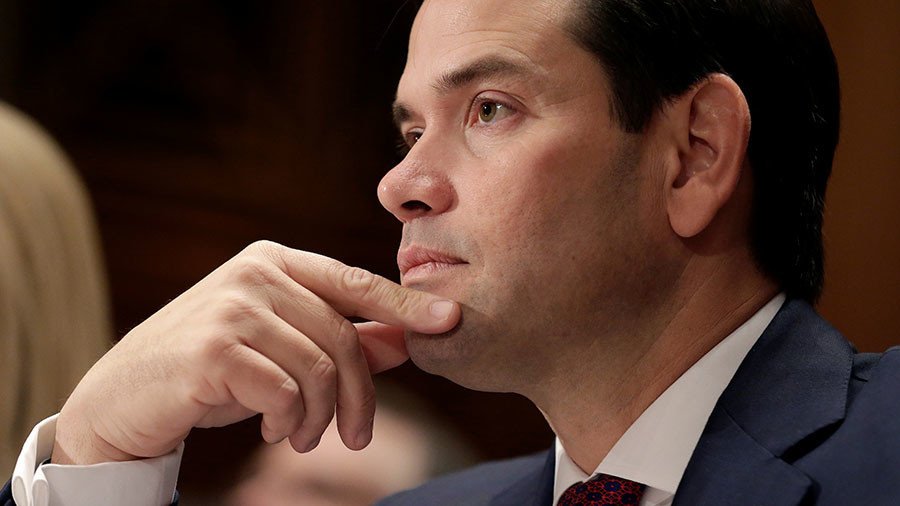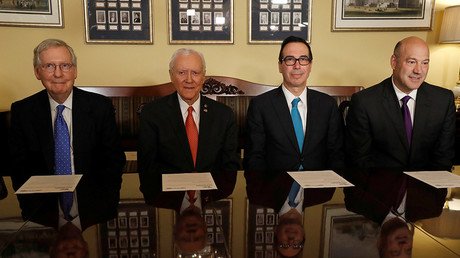Tax reform imperiled: Rubio threatens ‘No’ vote over child tax credit

Florida Senator Marco Rubio (R) is threatening to vote against his party’s tax cut bill unless the child tax credit is made more generous to help working-class families paying payroll taxes and not regular income taxes.
Rubio told reporters on Capitol Hill on Thursday that the current child tax credit (CTC) is insufficient.
“Right now, it's only $1,100. It needs to be higher than that,” Rubio told reporters, according to The Hill, referring to the CTC being negotiated in a congressional conference committee.
“I understand that this is a process of give and take, especially when there's only a couple of us fighting for it,” he told reporters. “Given all the other changes they've made in the tax code leading into it, I can't in good conscience support it unless we are able to increase the refundable portion of it.”
The move intensified divisions among conservatives, as the bill's prospects remain unsure.
Sen. Marco Rubio threatening to vote against tax cut bill unless it contains a back wax credit.
— Ann Coulter (@AnnCoulter) December 14, 2017
I'm sympathetic to what Rubio is trying to do & we'll see if he can reallocate some of the dollars "freed up" by reducing the corporate rate cut by 1 percentage point. But he should not kill the bill if he doesn't get his way.
— Guy Benson (@guypbenson) December 14, 2017
Senators Rubio and Mike Lee (R-Utah) proposed a child tax credit expansion amendment earlier this month, raising the credit to $2,000 while also raising the bill’s corporate tax rate from 20 percent to 20.94 percent, but the Senate voted down the proposal.
Adding at least a few hundred $’s in refundable cuts for working families who seem to always be forgotten isn’t hard to do either 2/2
— Marco Rubio (@marcorubio) December 14, 2017
“Adding at least a few hundreds $’s in refundable cuts for working families who seem to always be forgotten isn’t hard to do either,” tweeted Rubio on Thursday.
“Tax negotiators didn’t have much trouble finding a way to lower the top tax bracket and to start corporate tax cut a year early.”
The Senate GOP can only afford to lose two of its 52 votes on the final version of the tax reform bill. Vice President Mike Pence would be called upon to break a tie in the upper chamber, and so he has canceled a scheduled trip to the Middle East.
During question time at the White House in the afternoon, a reporter asked about the two potential “No”s in the Senate and whether the president would be more generous with the child tax credit in order to win Rubio’s support.
“Look, we're really proud of the work that we've done already up until this point, with Senator Rubio, already doubling the child tax credit, taking it to $2,000 per child,” said Sarah Huckabee Sanders. “We're going to continue working with the senator. We're going to keep working with him until we get the job done, which we still expect to happen before the end of the year.”
If Rubio votes against the bill, Republicans can only lose one other lawmaker if they hope to pass the final bill that emerges from a House-Senate conference. President Donald Trump has promised a “Christmas present” to Americans in the form of tax cuts, but Democrats have called on the GOP to vote on reform in 2018, after Senator-elect Doug Jones of Alabama is seated. Republicans would only have 51 votes in the chamber at that point.
Senator Lee has not said whether he will vote for the current version. Senator Bob Corker (R-Tennessee) previously voted against the Senate tax bill because it would add $1.5 billion to the deficit, and no Democrats support the bill. Corker has not ruled out voting for the final conference report, but did say “the issues I had before are still there.”
In the current bill, businesses receive 70 percent of the tax relief and families receive only 30 percent, according to National Review, a neo-conservative publication.
The child tax credit was first introduced by Republicans during the Contract for America in 1995. Under the Taxpayer Relief Act of 1996, a $500 child tax credit was introduced.













